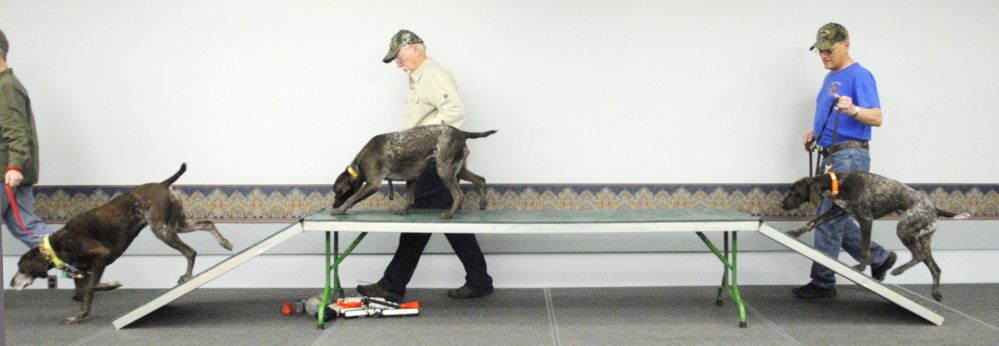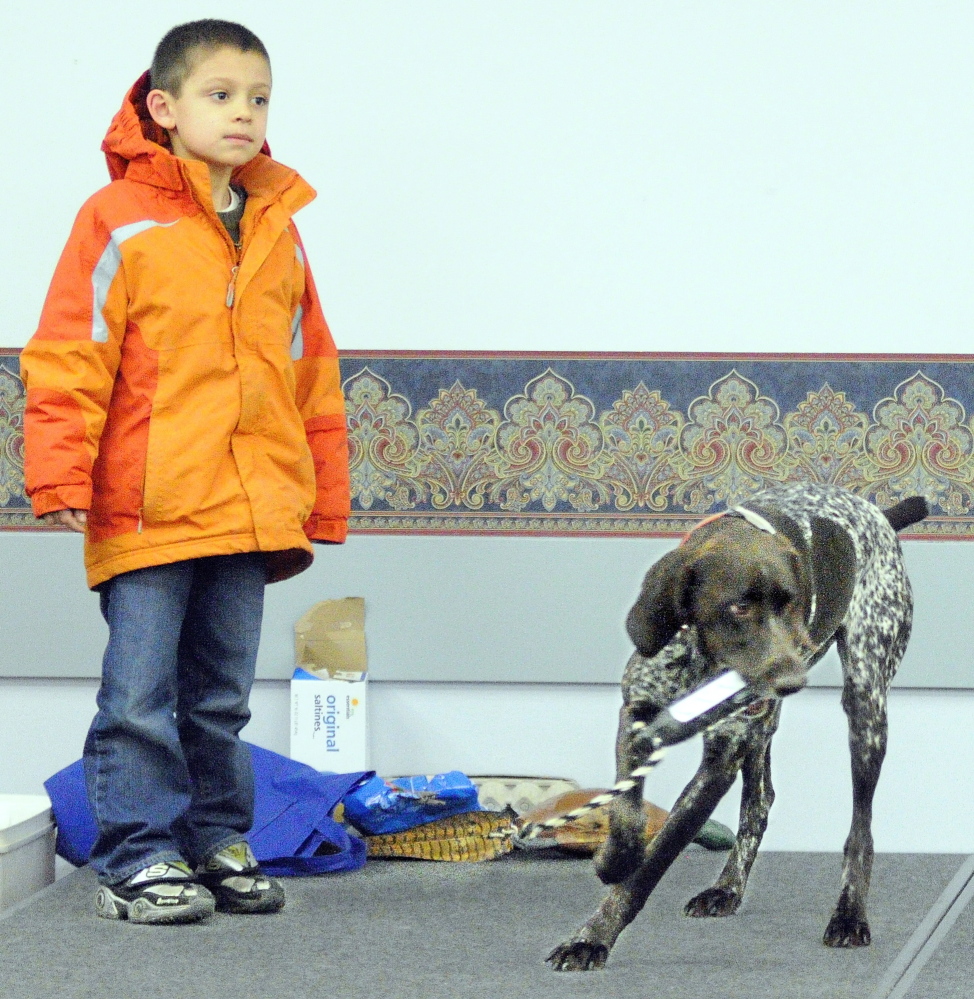AUGUSTA — Blaine Carter gave an impromptu demonstration in the lobby of the Augusta Civic Center’s North Wing following his hunting dog training seminar Friday at the Maine Sportsman’s Show.
This time there were no dogs involved, just Carter and a female spectator who had watched his show. Carter played the part of a dog while the lady played the owner, first without a leash, then with one.
“Let’s go for a walk,” Carter said.
As his “owner” began to walk, Carter balked. After some encouraging words in a soothing tone, he began to walk, then run. “Stop,” she yelled as Carter bolted out the door. When she calmed down, so did Carter. Later, when she jerked on his leash, he balked again. Point taken.
“These guys are really more intelligent than we want to give them credit for,” Carter said of canines. “Their ability through body English to communicate what they want to us is amazing even though they can’t speak. It has to be because the average guy (can train them). Once the owner’s got the program, it’s a piece of cake.”
Carter, who is director of training for the Yankee Chapter of the North American Versatile Hunting Dog Association (NAVHDA), has trained dogs professionally since 1974. The Brunswick native has conducted his popular seminars at the Sportsman’s Show since it began 34 years ago.
Several NAVHDA members brought their dogs to Friday’s seminar for the first of three shows conducted by Carter and his wife Patti. They’ll be at it again tonight at 6 and Sunday at 2 p.m.
“All these dogs were trained by their owners,” said Carter, who has lent them his expertise. “If you’re confident in your training then you’ll have the confidence to do that training.”
Carter gave a brief overview of what goes into training a successful hunting dog, principles that can applied to a family pet as well. Most dogs are food driven he said, adding a “food driven dog will follow you to the ends of the earth.”
Carter begins training his dogs when they’re between eight and 14 weeks old and said 10 minutes a day is enough time to get the job done. He said 90 percent of what they need to learn can be communicated through voice tone and body English. He and their many of owners put the dogs through their paces, demonstrating their ability to heel, stay, come and later to retrieve. Many of the dogs were German Shorthaired Pointers, popular among hunters today, but Carter said when it comes to training, the breed isn’t the only factor.
“It’s all in the personality of the dogs,” he said. “Some dogs are easier to train than others.”
Dogs need just three basic commands — heel, stay or whoa, and come — Carter said, demonstrating all three on a training table.
“Praise and repeat,” he emphasized.
Using training boards, he showed how dogs can be trained to come to a particular spot when retrieving. Later, the dogs showed their bite discipline while holding objects ranging from car keys to cell phones in their mouths without damaging them.
“You’re telling the young dog, âfetch, don’t eat it,’ ” he explained.
He then gave the dogs a greater test by putting Saltine crackers in their mouths. A few of them couldn’t resist the temptation of swallowing the tasty snacks while a couple passed. Then he had two of dogs retrieve a 10-pound dumbbell at one end of the stage and a raw egg at the other, each dogs handling their quarry with equal delicacy. The ultimate test came when three of the dogs separately took the stage with a live harnessed grouse, stopping to point just inches from the bird.
“The instinct I don’t create, God gave them that,” Carter said. “The cooperation I develop.”
Gary Hawkins — 621-5638 ghawkins@centralmaine.com Twitter: @GaryHawkinsKJ
Copy the Story LinkSend questions/comments to the editors.




Success. Please wait for the page to reload. If the page does not reload within 5 seconds, please refresh the page.
Enter your email and password to access comments.
Hi, to comment on stories you must . This profile is in addition to your subscription and website login.
Already have a commenting profile? .
Invalid username/password.
Please check your email to confirm and complete your registration.
Only subscribers are eligible to post comments. Please subscribe or login first for digital access. Here’s why.
Use the form below to reset your password. When you've submitted your account email, we will send an email with a reset code.